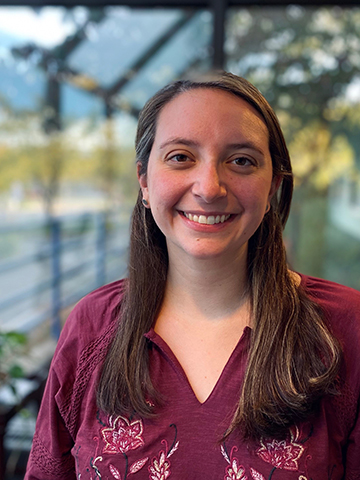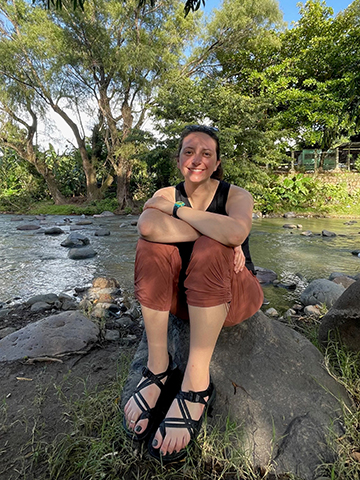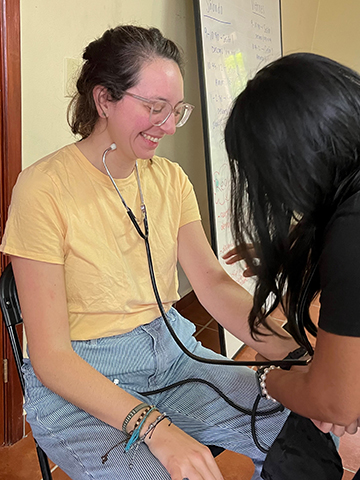MPH Candidate Ashley Richard Blends Jesuit Mission With Global Health Goals
Ashley Richard, a second-year Master of Public Health candidate concentrating in Global Health, is combining the importance of values, Jesuit mission, and how they have formed who she will be as a global health practitioner.
Richard got her start during her undergraduate career at The Catholic University of
America (CUA) where she earned a Biology and Spanish for International Service degrees.
As a frequent participant in Campus Ministry programming like weekly service opportunities,
Richard aimed to meld her academic interests with her faith.
Finding a passion for public health

Her passion for global health began early on in her academic career, she was able to study abroad in Buenos Aires, Argentina, which allowed her to immerse herself in a culture and language different from her own.
“What sparked my interest in public health was learning medical Spanish, and working at a nutrition non-profit,” she said.
She adds that one course she took on the health system in Argentina exposed her to structural injustices, such as health disparities and inadequate access for the poor while shadowing public and private healthcare professionals in the system..
The seed that was planted in Argentina grew when Richard had the opportunity to visit Ecuador on an immersion trip, a country where she later lived while doing a year of service after graduating from CUA.
Richard describes her year with Rostro de Cristo, in Guayaquil, Ecuador, as an “earth-shattering experience that opened up my perspective, and I would even argue completely changed my trajectory.”
“What drove me to Rostro (de Cristo) was the emphasis on being and not doing, the aspect of accompaniment and building relationships of mutuality and solidarity with my neighbors in Ecuador and my Rostro community mates.” she said.
For Richard, the global health connection came from volunteering at Damien House, a dignified home and residential hospital for former Hansen’s disease (leprosy) patients, many of whom experience the disease’s stigma in Ecuador. There, she spent time building relationships with residents through conversation, running games and activities, and hosting groups visiting to spread knowledge and awareness of Hansen’s.
“What drives my work now is accompaniment and understanding what it means to be in
relationship with another and be a suffering presence.”
Finding value at SLU
After returning to the United States during the COVID-19 pandemic, Richard served a second year with Rostro, in Camden, New Jersey, working with a non-profit that serves people experiencing homelessness.
“The Jesuit mission is what drove me to Saint Louis University (SLU). Because of those values, I knew the approach to social justice and health equity would distinguish CPHSJ from other programs,” she said. “My previous experiences and relationships, especially from my time in Ecuador, was what I was hoping to bring to the classroom, as a basis to what global health and public health is, and where I am going within that field.”
Since joining SLU, Richard has worked as a Graduate Research Assistant for Dr. Ricardo
Wray, professor of Behavioral Science and Health Education and served as the service
chair for the Student Association for Public Health (SAPH). Currently, she is a Graduate
Intern with Campus Ministry, in which she supports various programs in the department
and supports students of all grade levels.
Applying experience
Each student in the CPHSJ Master of Public Health (MPH) program is required to complete an Applied Practical Experience (APEx).This requirement offers an opportunity for MPH students to integrate their classroom learning, which provides a broad spectrum of public health skills, into experiential learning.

The broad goals of the MPH APEx are to develop core public health competencies, to provide service to the cooperating agencies and to prepare students for their careers in public health.
For Richard’s APEx, she served as a Project Coordinator for Central American projects with International Health Education for Local People (IHELP), a capacity building non-profit organization that partners with international communities to recruit, train, and certify Community Health Workers (CHWs) to strengthen local health systems.
“What attracted me to the work of IHELP was their emphasis on relationship-building and preventing disease through health education. We want to partner with you [the communities] to affect health change in your community. Our focus is on empowerment, community leadership and involvement, not on entering into communities and telling them what is best for them; communities know what their needs are the best,” she said. “My internship was an opportunity to live out many of the values that I embodied during my years of service to build relationships with CHWs, that are in a sense people who accompany other people.”
During her time at IHELP, Richard has worked in project management, assessment, monitoring and evaluation, while traveling to implement projects in various countries. In June 2022, Richard traveled to rural El Salvador, where she worked on a project with the municipality of Texistepeque, to train CHWs groups among different villages.
Then, in November of the same year, Richard traveled to Honduras to conduct an assessment
of a potential project with a clinic to train their health committee to become CHWs.
While there, Richard also implemented a CHW training near Tegucigalpa to train staff
at a local boy’s home on preventing childhood illnesses.
Understanding pillars of global health
“I feel particularly drawn to Catholic Social Teaching (CST), and different pillars that exist within that framework that I find very important to being a global health practitioner. Firstly, subsidiarity, meaning local health systems strengthening community ownership and working with communities rather than working for communities,” she said. “The bottom-up approach to global health is what I have seen to be most sustainable, because oftentimes the top-down approach is used, in cases where organizations enter communities to ‘teach the correct way.’ Instead we need to be listening to the community members’ themselves so they are empowered agents of change.”

Richard applies the philosophy of theologian Fr. Gustavo Gutierrez when he says “so you say you love the poor, name them.” She says, “within the context of global health, this looks like creating a preferential option for the poor and vulnerable in quality healthcare access because of their inherent human dignity.”
Another pillar of CST Richard resonates with is solidarity, meaning acknowledging that one’s personal experience is never going to match that of another, however how can one approximate oneself to another person to listen and learn.With those pillars in mind, she urges global health practitioners to question, “why do we do what we do, and from what lens?” because it is important to find ways to accompany and uplift voices, particularly those of the poor relating to health.
“We need to be listening to and discerning with others to have critical consciousness, and that starts with relationship and encounter (with the poor). Sustainable change is going to come from the bottom-up, not the top-down, it's going to come from communities” she said.
After graduation, Richard will continue to work with IHELP as a Fellow where she will work on various CHW and health education projects with international communities. She hopes to continue incorporating theology and Jesuit values, such as discernment and cura personalis, in her global health work while pursuing opportunities that make those intersections and keeping people at the center of her work.
College for Public Health and Social Justice
The Saint Louis University College for Public Health and Social Justice is the only academic unit of its kind, studying social, environmental and physical influences that together determine the health and well-being of people and communities. It also is the only accredited school or college of public health among nearly 250 Catholic institutions of higher education in the United States. Guided by a mission of social justice and focus on finding innovative and collaborative solutions for complex health problems, the college offers nationally recognized programs in public health and health administration.